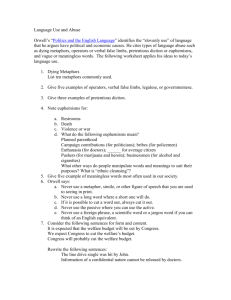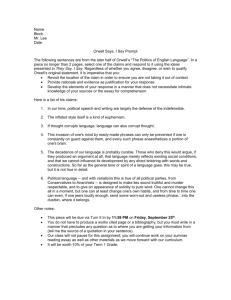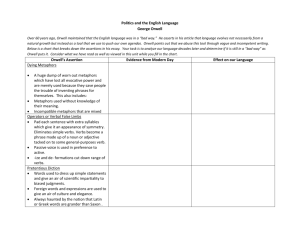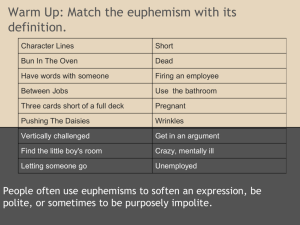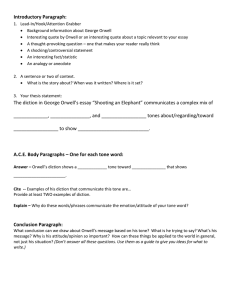Politics and the English Language Lecture
advertisement
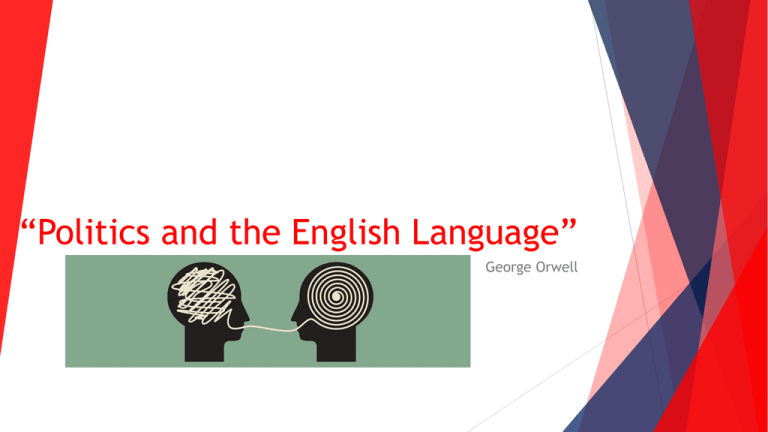
“Politics and the English Language” George Orwell Overview “A man may take to drink because he feels himself to be a failure, and then fail all the more completely because he drinks. It is rather the same thing with the English language. It becomes ugly and inaccurate because our thoughts are foolish, but the slovenliness of our language makes it easier for us to have foolish thoughts. The point is that the process is irreversible” (Orwell 1). Overview Orwell was disturbed by the progress of the English language, thinking that the language was being made simple In addition to being lazy, Orwell thought that simple language made it easy to think simple thoughts; the more simple the thoughts, the more simple the language would become… and it would go on and on like this until English speakers were almost unable to think for themselves (or, at least, to think with any form of real complexity) Overview Orwell saw 5 primary “tricks” used in modern English to get people to not think very deeply: 1. Dying metaphors 2. Operators/verbal false limbs 3. Pretentious diction 4. Marxist language (a bigger deal at the time because of the rise of communism) 5. “Meaningless” words As we read through these examples, we will talk about why Orwell was bothered by them. The first two examples are on page 3 of the essay. Dying Metaphors A dying metaphor is a metaphor that has been around so long it has either 1.) lost its original meaning, or 2.) has no meaning to anyone anymore. Remember: metaphors are intended to put an image in the reader’s head. If it doesn’t do that, then it doesn’t mean much. Examples: Toe the line (originally meaning to stand behind the start line at a race; play by the rules) Brand new (originally meaning wood that had just been cut and had a brand burned into it) Whole new ballgame (originally used to describe a comeback in baseball; a situation that is now very uncertain) Deadline (originally used to describe the line around a prison where escaping prisoners would be shot dead) Why are dying metaphors bad? Dying/dead metaphors don’t add anything to a sentence. They sound like they add something, but they’re meaningless anymore. Orwell accused them of being “lazy” A good writer or someone who actually had something important to say would come up with another way to make his/her point Operators/Verbal false limbs These sound complicated, but they’re really not! These are what I might call “unnecessary wordiness”; for example: “Give rise to” (instead of “create”) “Have the effect of” (instead of just “effect”) “Play a leading part in” (instead of just “lead”) “Serve the purpose of” (instead of just “serve”) Using the passive voice instead of the active voice Passive Voice: The car was driven by me. Active Voice: I drove the car. Why are false limbs bad? They give the appearance of saying something important, but actually just serve to make what you’re saying more complicated. One of the problems with what I said above is what could happen as a result: if people can’t follow what you’re saying, then you could pull things over on them/trick them (Plus they sound stupid) Pretentious Diction “Fancy word” use; especially using foreign words for things we already have words for in English. See page 4 of the essay for some examples. Why is pretentious diction bad? According to Orwell, it’s just not practical. We already have plenty of words in the English language; why don’t you just use a word we all understand? Along the same lines as operators and verbal false limbs, pretentious diction makes it sound like you have a lot more to say than you really do. Plus, people may not understand you, but they will go along because they don’t really know what you’re talking about. Marxist Writing Without going into too much detail: communist movements tended to make up a bunch of cool sounding words that didn’t really mean much. Why is it bad? See slide on pretentious diction. “Meaningless” Words These are words that are being used imprecisely. They are often used like they have great importance, but they don’t ever actually point to any real concept. Political Examples: Freedom Democracy It’s not that these words aren’t important, it’s just that their meanings are fuzzy. When they are used, it is up to each individual to define the word for his/herself. This can be used to deceive people. This is why Orwell considered them particularly bad. The Issues (As Orwell – and Helton – see them) THE REASON WHY WE STUDY LANGUAGE IS NOT BECAUSE YOU NEED TO WRITE A TEXTBOOK ESSAY TO LIVE! The reason is… Language is arguably the most important development in human history. It is also, of course, the vehicle that spreads all ideas. If language is simple – or if it is so convoluted that you don’t know what you’re being told – then what does it say about those ideas (and your ability to think on your own)? History is full of examples of societies that were brought down by leaders/governments who fooled their populations by manipulating ideas and language (you probably don’t have to think too hard to come up with a few) If you speak without thinking, then you are letting your language think for you. (Think about that the next time you’re telling “bae” that her eyebrows are “on fleek”) How do I fix this (and learn to think for myself again)??? Orwell suggested six rules to fix these issues (these are found on page 10 of the essay): I. Never use a metaphor, simile, or other figure of speech which you are used to seeing II. Never use a long word where a short one will do III. If it is possible to cut a word out, always cut it out (concision) IV. Never use the passive voice where you can use the active V. Never use a foreign, scientific, or jargon word if you can think of an everyday English word that means the same thing VI. Break any of these rules if they impede you from being as clear as possible The Takeaway Can you single-handedly change the English Language? No. Can you change your habits? Yes. Enough people change their habits, and the language changes. The language changes, and our thought changes. If we continue to go down the simple road, we will become more simple. And the language will become more simple, so we will become more simple. And so on… and so on… and so on… and so on…
